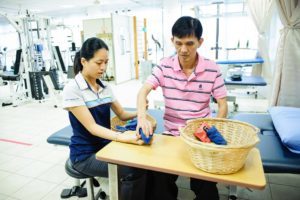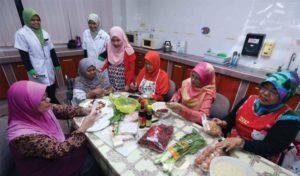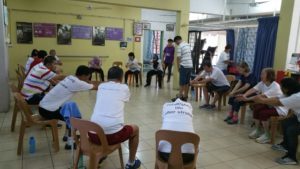OCCUPATIONAL REHABILITATION

Picture source: spd.org.sg
Occupational Rehabilitation is a profession related to increasing health and well-being through work/occupation. Occupation can be defined as a beneficial daily activity in which a person actively participates or occupies himself. The main purpose of Occupational Therapy is to identify a person’s strengths and inhibitions to function and further enables them to participate in needed and desired (job) activities and fulfil their role in life. An Occupational Therapist is a registered healthcare professional, interested in increasing their clients’ ability to function (clients being the people who receive their service).
OCCUPATIONAL THERAPY IN MENTAL HEALTH
Occupational Therapy in Mental Health uses a client-centric approach to obtain an understanding of the various factors surrounding a person’s occupation (occupation defined as related to tasks) and environments which influences the mental health and the client’s functionality. An Occupational Therapist in Mental Health evaluates occupations most significant to their clients. This approach enables the client to identify and get involved with occupations in a working setting and also at home. Being involved in a meaningful and determined occupation will contribute to the client regain their sense of achievement, self-esteem and well-being that may have been affected by their condition.
OCCUPATIONAL THERAPY – PSYCHIATRY UNIT
(In-ward patients)

Picture source: Harian Metro
Occupational Therapy – Psychiatry Service is rendered to patients experiencing mental health and social problems in all age groups and concentrates on the aspect of evaluating in-ward patients and their functionality training in managing themselves and their living space, exercise and free-time activities, social skills, work management and other aspects pertaining to one’s life functions. The medium of treatment used in re-training or increasing the patient’s functionality is by using selected and specific activities which have therapeutic or rehabilitative values, gradually. The objective of the treatment is to increase health, maintain and increase the ability, and helping in achieving the maximum level in their functionality and independence.
Working in the acute phase, the patient will be very dependent; this should be initiated with small steps. This step can be done in groups or individual sessions, or by evaluating daily activities like making their bed. What skill is needed? Do they possess that skill? Can they repeat it?

Picture source: mca.org.my
Occupational Therapy for patients is largely done in groups, so it is not only for occupying their fee-time, but also to develop skills. Occupational Therapists may conduct group sessions based on a specific skill, such as communication development groups of problem-solving groups. If a patient feels lack of confidence, having difficulties when going to a restaurant or local eateries, or going shopping or managing their budget, they may require practical support to return to doing those activities again.
HASNAH WATI HATIB, OCCUPATIONAL THERAPIST, UMMC
This article was translated from https://www.mmgazette.com/terapi-carakerja-dalam-kesihatan-mental-hasnah-wati-hatib/ by Azizul Ismie Mohd Puad.
[This article belongs to The Malaysian Medical Gazette. Any republication (online or offline) without written permission from The Malaysian Medical Gazette is prohibited.]
